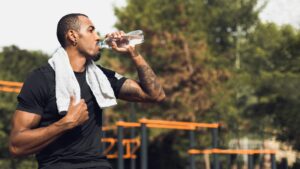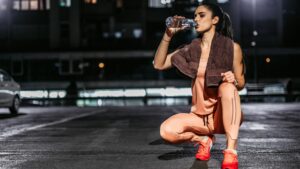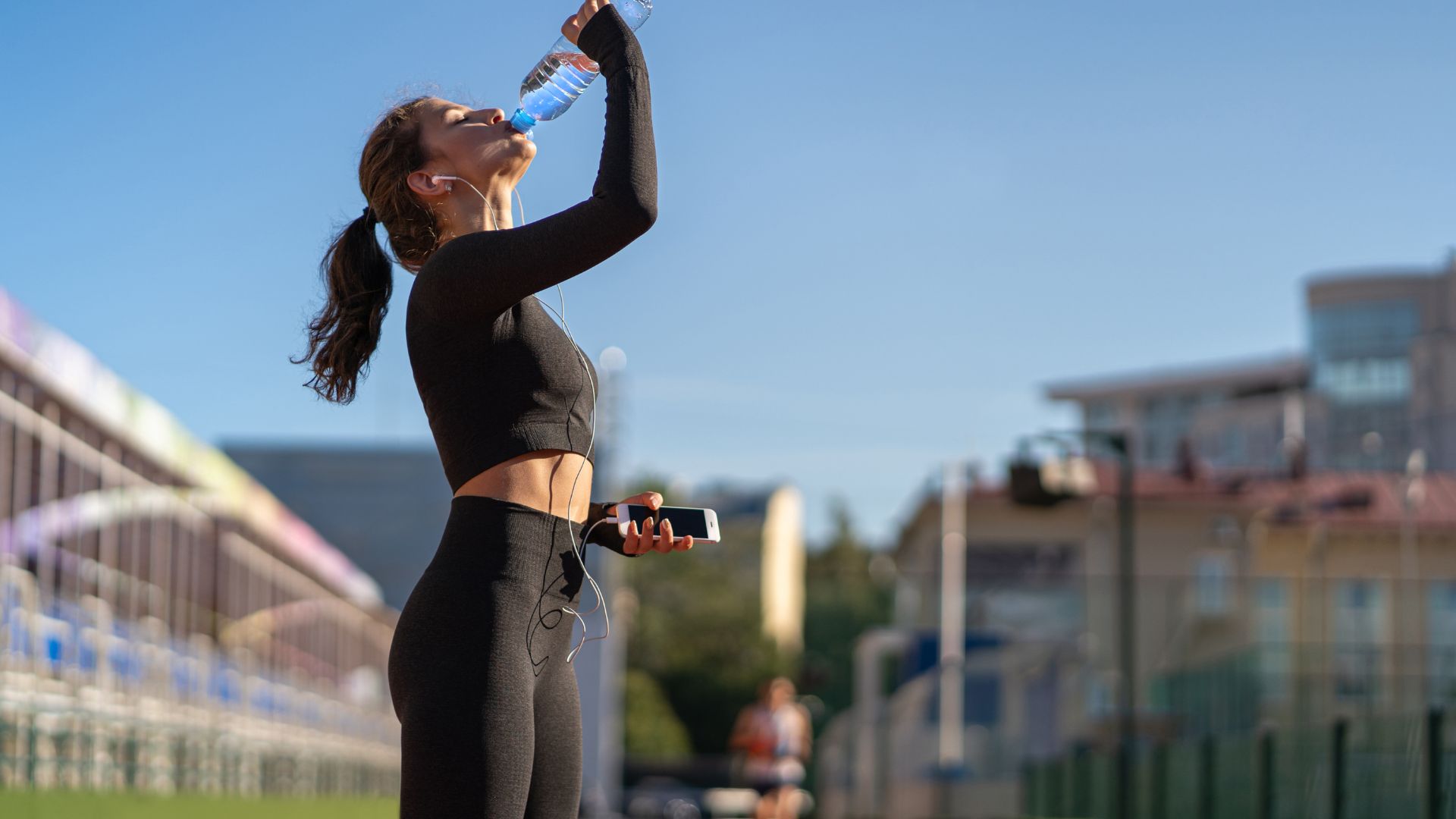Welcome to our blog post on the importance of hydration after squats. In this article, we’ll explore the compelling reasons why you should prioritize drinking water following your squat workout.
From preventing dehydration to enhancing muscle function and overall exercise performance, discover how proper hydration can significantly impact your fitness journey.
Understanding if you Should drink water after squats and why?
Yes, it’s essential to stay hydrated after doing squats or any form of exercise. When you perform squats, you lose fluids through sweat, and staying hydrated is crucial for several reasons.
Here’s the thing:
Preventing Dehydration: Dehydration can lead to decreased exercise performance, muscle cramps, and even dizziness or fainting. By drinking water after squats, you can help prevent dehydration.
Muscle Function: Water is essential for muscle function. It helps transport nutrients and oxygen to your muscles and removes waste products. Staying hydrated can aid in muscle recovery and reduce the risk of injury.
Temperature Regulation: Sweating is your body’s natural way of regulating temperature during exercise. Adequate hydration helps maintain your body’s ability to cool down, preventing overheating.
Cognitive Function: Dehydration can affect your concentration and cognitive function. Staying hydrated can help you stay focused and alert during and after your workout.
To ensure you stay adequately hydrated after squats or any exercise, follow these guidelines:
- Pre-Hydration: It’s a good idea to start your workout session well-hydrated. Drink water throughout the day leading up to your workout.
- During Exercise: Depending on the duration and intensity of your workout, consider sipping water during breaks. You don’t need to drink excessively, but maintaining a steady intake is important.
- Post-Exercise: After your squats or workout, drink water to replenish the fluids lost through sweat. A general guideline is to aim for at least 16-20 ounces (about 500-600 ml) of water within the first hour after exercise and continue hydrating throughout the day.
- Listen to Your Body: Everyone’s hydration needs are different, so pay attention to your body’s signals. Thirst is a good indicator that it’s time to drink more water.
Remember that individual hydration needs can vary based on factors like body size, activity level, and environmental conditions (e.g., heat and humidity). Therefore, it’s important to personalize your hydration strategy to meet your specific needs. Drinking water after squats is just one part of a comprehensive approach to staying hydrated during and after exercise.

Further Explanations.
Let’s delve deeper, let me explain these points mentioned further.
let’s delve deeper into how hydration impacts exercise performance and muscle function:
Preventing Dehydration:
Exercise Performance:
Dehydration occurs when your body loses more fluids than it takes in, primarily through sweating.
When you’re dehydrated, your blood volume decreases, which means there’s less blood available to circulate oxygen and nutrients to your muscles and other vital organs. This reduced blood flow can lead to a drop in exercise performance.
You may find it harder to complete your squats or any other exercise routine, and your strength and endurance can be compromised.
Muscle Cramps:
Dehydration can also increase the risk of muscle cramps. Muscle contractions depend on the proper balance of electrolytes (like sodium and potassium) and fluids.
When you’re dehydrated, this balance is disrupted, and your muscles may be more prone to involuntary contractions, leading to cramps and discomfort.
Dizziness or Fainting:
Severe dehydration can cause a drop in blood pressure, which can lead to dizziness or even fainting. This is particularly dangerous during or after exercise, as it increases the risk of injury.
Muscle Function.
Transport of Nutrients and Oxygen:
Water is a crucial component of blood, and blood is responsible for transporting nutrients, oxygen, and hormones to various parts of the body, including your muscles.
During exercise like squats, your muscles require an increased supply of oxygen and nutrients to perform efficiently.
Adequate hydration helps maintain blood volume and ensures that these essential substances are delivered to your muscles in sufficient quantities. This supports their function and performance.
Waste Removal:
Muscles produce waste products, such as lactic acid, as a natural byproduct of energy production during exercise.
Proper hydration is essential for removing these waste products from your muscles efficiently. If waste products accumulate due to dehydration, it can lead to muscle fatigue and soreness.
Reducing the Risk of Injury:
Dehydration can increase the risk of muscle injuries. When your muscles are dehydrated, they are less elastic and more prone to strains and tears.
Hydration helps maintain muscle flexibility and reduces the likelihood of injuries during exercises like squats.
In essense, staying hydrated is vital for exercise performance and muscle function. Water ensures that your muscles receive the necessary nutrients and oxygen, removes waste products, and maintains proper blood flow.
By drinking water after squats and throughout your workout routine, you can help prevent dehydration-related issues, optimize muscle function, and reduce the risk of performance setbacks or injuries.
let’s explore in more detail how hydration plays a critical role in temperature regulation and cognitive function during and after exercise:
Temperature Regulation.
Sweating and Cooling:
During exercise, especially intense physical activities like squats, your body generates heat. To regulate your body temperature and prevent overheating, your body relies on sweating.
When sweat evaporates from your skin, it helps dissipate excess heat, keeping your body within a safe temperature range.
However, this process requires water. If you’re dehydrated, you may produce less sweat, which can impair your body’s ability to cool down efficiently.
This can lead to overheating, which can be dangerous and potentially result in heat-related illnesses, such as heat exhaustion or heatstroke.
Adequate Hydration:
Staying adequately hydrated supports the sweating process. When you’re well-hydrated, your body has a sufficient supply of water to produce sweat, facilitating the cooling mechanism. This is crucial for maintaining a comfortable body temperature and preventing heat-related issues during and after your workout.
Cognitive Function.
Impact of Dehydration:
Dehydration doesn’t just affect your physical performance; it can also have cognitive consequences.
When you’re dehydrated, your brain may not function optimally. Studies have shown that even mild dehydration can lead to difficulties with concentration, alertness, and short-term memory.
This can result in decreased mental clarity and focus during your squats or any other exercise routine.
Maintaining Focus and Alertness:
Staying hydrated helps ensure that your brain receives the necessary blood flow and oxygen. This supports cognitive functions and helps you stay focused, alert, and mentally sharp during your workout.
It’s essential to maintain this cognitive function not only for performance but also for safety, as being alert can prevent accidents or injuries during exercise.
In other words, proper hydration is essential for both physical and cognitive aspects of exercise, including temperature regulation and maintaining focus and alertness.
By drinking water before, during, and after your squats or any workout, you can help your body manage heat effectively and support your brain’s functions, ultimately enhancing your overall exercise experience and safety.
follow these guidelines To stay adequately hydrated.
Let’s explore the importance of pre-hydration and staying hydrated during exercise in more detail:
Pre-Hydration (Before Your Workout):
Starting Well-Hydrated:
Pre-hydration involves ensuring that you’re adequately hydrated before you even begin your workout. When you wake up in the morning, you’ve likely gone several hours without fluids while sleeping.
To kickstart your hydration, it’s a good idea to drink water shortly after waking up. This initial hydration helps replenish the fluids you lost during the night and sets a foundation for your upcoming exercise session.
Throughout the Day:
It’s not enough to rely solely on the water you drink immediately before exercise. Hydration is an ongoing process.
Throughout the day leading up to your workout, continue to drink water at regular intervals. This gradual approach allows your body to absorb and retain the water effectively, ensuring that you start your workout in a well-hydrated state.
Urine Color:
A helpful indicator of your hydration status is the color of your urine. Pale yellow or straw-colored urine typically indicates good hydration, while darker urine may be a sign that you need to drink more water. Keep an eye on your urine color throughout the day to gauge your hydration levels.
During Exercise.
Duration and Intensity:
The amount of water you need during exercise depends on factors like the duration and intensity of your workout, as well as environmental conditions (e.g., temperature and humidity). Longer and more intense workouts typically result in more significant fluid loss through sweating.

Sipping Water:
During your workout, especially during breaks, it’s essential to sip water to maintain hydration.
Sipping, rather than gulping, helps prevent overhydration or discomfort. Overhydration can dilute your blood’s sodium levels, leading to a condition called hyponatremia, which can be dangerous.
Electrolytes:
Depending on the duration and intensity of your exercise, you may also need to consider electrolyte replenishment, especially if you’re sweating heavily.
Electrolytes like sodium and potassium are lost through sweat and are essential for muscle function. You can choose sports drinks or electrolyte supplements for more extended or intense workouts to help maintain electrolyte balance.
Thirst as a Guide:
Pay attention to your body’s signals. Thirst is a natural indicator that it’s time to drink more water. During longer workouts, make sure to drink water during planned breaks to quench your thirst and maintain hydration.
In summary, pre-hydration is about starting your workout well-hydrated by drinking water throughout the day leading up to it. During exercise, the key is to balance your hydration needs with the duration and intensity of your workout.
Sipping water during breaks is generally a good strategy to ensure you maintain a steady intake without overdoing it, but listen to your body and adjust accordingly.
Proper hydration strategies are crucial for optimizing performance, preventing dehydration, and ensuring your safety during exercise.
let’s delve into the importance of post-exercise hydration and the significance of listening to your body’s signals:
Post-Exercise Hydration.
Replenishing Fluids:
After your squats or any workout, it’s crucial to replenish the fluids you’ve lost through sweating.
Sweating helps regulate your body temperature during exercise, but it also leads to fluid loss. To recover and rehydrate, you should drink water promptly after your workout.
General Guideline:
A widely recommended guideline is to aim for at least 16-20 ounces (about 500-600 ml) of water within the first hour after exercise.
This helps kickstart the rehydration process and replaces some of the fluids lost during your workout. It’s important to continue hydrating throughout the day to fully restore your fluid balance.
Electrolyte Consideration:
Depending on the duration and intensity of your exercise and the extent of your sweating, you may also need to consider replenishing electrolytes
. While water is essential for rehydration, sweat contains not only water but also electrolytes like sodium and potassium.
You can choose sports drinks or electrolyte-rich foods to help restore these electrolytes, especially if you’ve had a particularly intense or lengthy workout.
Listening to Your Body.
Individual Variations:
It’s important to recognize that everyone’s hydration needs can vary based on factors such as body size, fitness level, environmental conditions, and individual sweat rates. What works for one person may not be ideal for another. This is where listening to your body becomes crucial.
Thirst as a Signal:
Thirst is a reliable indicator of your body’s need for water. When you’re thirsty, it’s your body’s way of telling you that it requires fluids. Pay attention to your thirst signals and respond accordingly by drinking water.
Urine Color:
Another helpful tool for gauging your hydration status is the color of your urine. As mentioned earlier, pale yellow or straw-colored urine typically indicates good hydration, while darker urine may suggest a need for more fluids.
Adapt to Your Environment:
Environmental factors play a significant role in your hydration needs. Hot and humid conditions can lead to increased sweat rates, requiring more significant fluid intake.
Conversely, in colder conditions, you may not lose as much fluid through sweat but should still stay adequately hydrated.
In summary, post-exercise hydration is crucial for recovery and overall well-being. Aim to drink water within the first hour after your workout and continue hydrating throughout the day.
However, remember that individual hydration needs can vary, so it’s important to listen to your body’s signals, especially thirst, and adjust your fluid intake accordingly.
This personalized approach ensures that you meet your specific hydration requirements for optimal health and performance.
A tabular on this topic here.
Here’s a tabular summary of why you should drink water after doing squats:
| Reason to Drink Water After Squats | Explanation |
|---|---|
| Preventing Dehydration | Dehydration can lead to decreased exercise performance, muscle cramps, and dizziness or fainting. Drinking water after squats helps prevent dehydration. |
| Muscle Function | Water is essential for transporting nutrients, oxygen, and removing waste products from muscles. Staying hydrated aids in muscle recovery and reduces the risk of injury. |
| Temperature Regulation | Sweating regulates body temperature during exercise. Adequate hydration helps maintain your body’s ability to cool down, preventing overheating. |
| Cognitive Function | Dehydration can affect concentration and cognitive function. Staying hydrated helps you stay focused and alert during and after your workout. |
| Pre-Hydration | Start your workout well-hydrated by drinking water throughout the day leading up to your workout. |
| During Exercise | Depending on workout duration and intensity, sip water during breaks to maintain hydration without overdrinking. |
| Post-Exercise Hydration | After your workout, aim for at least 16-20 ounces of water within the first hour to replenish lost fluids and continue hydrating throughout the day. |
| Listen to Your Body | Pay attention to your body’s thirst signals and adapt your fluid intake based on individual needs and environmental factors. |
Conclusion.
In conclusion, drinking water after squats is essential for preventing dehydration, supporting muscle function, regulating body temperature, and maintaining cognitive focus.
It’s important to establish a pre-hydration routine, stay adequately hydrated during exercise, and prioritize post-exercise hydration while listening to your body’s signals for optimal performance and well-being.

Hey there, it’s Mike Rrsq, the Editor-in-Chief over at Jsquat.com, and I’m absolutely obsessed with all things squat fitness! I’ve been lucky enough to get some serious recognition for my work in this field. With a solid background in the fitness and wellness industry, I’ve been there right from the get-go, helping shape this website into what it is today.
You see, I’m not just the boss around here; I’m also a passionate contributor. I love sharing my insights through my articles, and trust me, they’re not your run-of-the-mill stuff. Each piece I write is a labor of love, filled with my expertise and real-world experience in the fitness universe. So, if you’re into fitness and looking for some inspiration, you’re in the right place!

